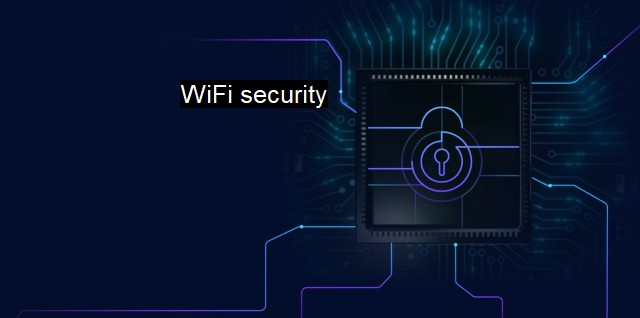What is WiFi security?
Securing Your WiFi Network: Understanding the Risks and Importance of Proper Security Protocols to Protect Your Confidential Data
WiFi security refers to the protective measures to ascertain the safety and integrity of a WiFi network from penetration or malicious damage. Cybersecurity, involving antivirus, forms a significant segment of WiFi security, discussing assaults on your internet devices, ensuring privacy, and facilitating secure data transfer.WiFi Security can be understood as key practices, guidelines, and protocols established to safeguard networks, devices, and data from potential unauthorized access or damage. Amid an increasingly digital world where most devices, ranging from smartphones and laptops to refrigerators and automobiles, are interconnected using WiFi, ensuring the security of such a network becomes utterly vital.
WiFi security entails various protocols. These protocols consider the methodologies to secure the communication over WiFi networks. The most common WiFi security protocols include WEP (Wired Equivalent Privacy), WPA (WiFi Protected Access), WPA2, and most recently, WPA3. Each generated to overcome the security limitations of its predecessor.
WEP was the first endeavor to secure wireless networks. WEP had several security deficiencies and was easily compromised, prompting the creation of WPA. WPA mitigated some vulnerabilities in WEP, yet security experts detected weak points. Thus, WPA2 was introduced with stronger data protection by providing network encryption - making unauthorized access to information significantly difficult. Meanwhile, WPA3 is an upcoming protocol said to offer more advanced security capabilities.
One critical aspect is how these protocols offer different levels of security. WPA3, the successor to WPA2, provides unique user data encryption, enhanced protection against bruteforce login attempts, and greater cryptographic strength for sensitive sectors such as government and finance.
Cybersecurity crystallizes its importance in the context of WiFi security. The majority of cyber attacks are targeted at WiFi networks, making cybersecurity measures indispensable firewalls between potential threats and sensitive information. antivirus and cyber security software together scan the network and associated devices for threats; separating harmful files from your device, identifying suspicious behavior and eradicating potential threats.
Antivirus works actively to prevent hackers from invading your network, thereby compromising personal data such as passwords, bank details, or any sensitive data that might otherwise be vulnerable. Faulty or inadequate WiFi security augmented with a lack of proper antivirus measures provides a pathway for attackers to gain control of devices and networks. As a result, maintains a robust defense line, combining WiFi security and an antivirus becomes necessary.
To harness better WiFi security, users can take several steps, such as altering default passwords and SSID (Service Set Identity), applying updated encryption settings, creating stringent firewall protocols, and ensuring a regularly updated network-based antivirus software combined with a fully-functional antitheft system.
Given the indispensability of WiFi networks and burgeoning technological advances, the demand for secure WiFi has swelled exponentially. the reliable guarantee of WiFi Security couldn't be provided by just having a password layer; instead, the integrity of WiFi infrastructure, network protocols, system firewalls, coupled with advanced antivirus measures all contribute to comprehensive WiFi security.
WiFi security necessitates being understood from the broader perspective of cybersecurity and antivirus application. Mismanaged or trivialized WiFi security can enable cybercriminals to exploit network vulnerabilities simply. Through strong passwords, secure encryption levels, firewall applications, consistent security updates, and robust antivirus software, WiFi users can significantly reduce their susceptibility to cyber threats. In reality, the significance of WiFi security excels beyond maintaining secure internet connectivity. It is about securing our increasingly interconnected world.

WiFi security FAQs
What is Wi-Fi security?
Wi-Fi security refers to the measures taken to protect wireless networks from unauthorized access and attacks. By implementing appropriate security measures, Wi-Fi users can reduce the chances of hackers intercepting sensitive information from their networks.Why is Wi-Fi security important?
Wi-Fi security is important because it can prevent sensitive data from being accessed by hackers or other unauthorized users on a wireless network. This can include personal data, bank account information, and other sensitive information. Without proper security measures, these types of information can easily be intercepted and misused.What are some common Wi-Fi security threats?
Some common Wi-Fi security threats include hacking, malware, man-in-the-middle attacks, rogue access points, and eavesdropping. All of these threats can lead to unauthorized access to Wi-Fi networks and sensitive information.What are some ways to improve Wi-Fi security?
There are several ways to improve Wi-Fi security, including using strong passwords, enabling encryption, updating software and firmware regularly, disabling remote access, disabling SSID broadcast, and using a virtual private network (VPN) when connecting to public Wi-Fi networks.| | A | | | B | | | C | | | D | | | E | | | F | | | G | | | H | | | I | | | J | | | K | | | L | | | M | |
| | N | | | O | | | P | | | Q | | | R | | | S | | | T | | | U | | | V | | | W | | | X | | | Y | | | Z | |
| | 1 | | | 2 | | | 3 | | | 4 | | | 7 | | | 8 | | |||||||